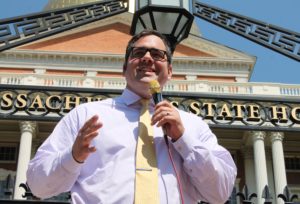Cambridge state Rep. Mike Connolly has offered a preview of what House progressives may push for if and when the House finally puts a housing production bill on the floor for debate.
Gov. Charlie Baker and others have been calling for months on the legislature to make it easier for zoning changes to pass at the local level as a way to help an increasingly strained housing market, but critics of his approach say it fails to address the major problem of housing affordability.
Cambridge Democrat Connolly has filed a multi-bill “Housing for All” package with measures that would revive the option for communities to enact local rent controls, spend an additional $1 billion on affordable housing and tax large businesses to finance a homelessness prevention fund.
“As progressives, as people on the left, we all agree when it comes to health care, the government is going to play a central role in making sure everyone has health care. When it comes to education, similarly, we all believe government should play a central role,” Connolly said. “Then, when we get to housing, we’re all over the place, and I think we rely too often on a market that isn’t working for most people.”
Rent Control, Mandatory Multifamily Zoning
One of the bills in the package, co-authored by Rep. Nika Elugardo, authorizes rent control – a practice that voters banned in a 1994 ballot question – but also would allow municipalities to implement tenant-protection measures, such as limiting the conditions under which evictions can occur, requiring landlords to accept up-front payments such as security deposits in installments, and regulating condominium conversions more strictly.
Connolly stressed that the Elugardo bill does not impose any mandates, instead allowing cities and towns to opt in to whichever restrictions, including rent control, they choose and then build the specific mechanics based on local needs.
Another local option proposed in one of the bills would allow communities to tax vacant units in large residential buildings, specifically targeting apartments and condos that wealthy tenants often rent or purchase but rarely visit. Participating towns and cities could charge a tax, calculated at 12.5 percent of the most recent rent, for units that have not been occupied for at least 90 days.
Some bills in the package do create statewide mandates, such as one requiring that communities zone for multifamily housing within a mile of public transit, an idea included in other legislation filed this session filed by the Joint Committee on Housing’s co-chair, Rep. Kevin Honan.
$1B for Affordable Homes
Progressive lawmakers who signed onto the package want to see significant state investment too, calling for additional spending to increase housing availability and protections for the most vulnerable residents.
One bill would authorize another $1 billion in bonding for housing production, building on the $1.8 billion lawmakers authorized last year. One quarter of the new money would be directed to public housing authorities, and the remainder would fund affordable housing development.
Targeting homelessness is a specific focus of Connolly’s. A different bill in the package – sharing the same “Housing for All” name as the entire legislative agenda – calls for a statewide “Homelessness Prevention and Reduction Fund” that would offer subsidized stable housing, mental health treatment and other support services to at-risk families, all funded by a tax on large companies.
The dozen-plus progressive lawmakers who cosponsored some or all of Connolly’s housing bills face questions about how feasible the proposals actually are. Even Baker’s comparatively modest legislation to change the local majority needed for zoning changes from two-thirds to 51 percent, which has support from a range of advocacy groups and many lawmakers, has yet to go before the legislature for a full vote despite first being filed last session.
Since 2010, Massachusetts added 245,000 jobs but only 71,600 new housing units, and most communities around Boston restrict zoning for affordable homes that can fit multiple tenants, according to a report released this month. Another study earlier in the year found that there are more than twice as many families on the lowest level of the income scale as there are units of housing available and affordable to them.







